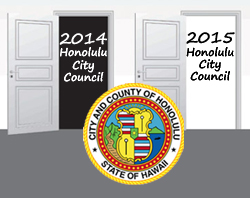
Going forward and looking back at the Honolulu City Council
by Rachelle Chang, Better Hawaii January 13, 2015
The 2015 Honolulu City Council officially opened on January 2. The Council meets once a month, year-round, and are open to the public as well as broadcast live on Oceanic Cable Channel 54 or TCI Channel 54. If there’s an issue that you feel strongly about, please consider submitting testimony at council or committee meetings.
Going forward in 2015, here are the top three things that I hope the Honolulu City Council can accomplish:
Allow the Oahu half-percent rail surcharge to sunset, as the law intends. The surcharge was meant to be temporary (like the unfortunate Transient Accommodations Tax) and keeping it in place will only encourage lawmakers to increase the surcharge whenever there is a rail transit shortfall.
Create reasonable limits on real property taxes. Homeowners should not be penalized when neighbors improve their properties or sell their homes, or when speculators invest in the neighborhood. Higher property taxes mean that homeowners, or their beneficiaries, could be forced out of their homes to pay skyrocketing property taxes. For example, the Council might limit annual increases on residential valuations to a maximum of $20,000 per year or 4% of the previous year’s valuation. This means that a $500,000 home could not be valued at more than $520,000 in the next tax year. Alternately, the Council might limit annual residential tax rate increases to not more than $0.25 per $1,000 net taxable property. This means that the current residential rate of $3.50 could not increase to more than $3.75 in the next tax year.
Enact staggered building height limits for new construction from makai (for example, a building height limit of 40 feet within one block of the ocean, and increasing in building height as properties move inland) to mauka (for example, a building height limit of 400 feet near mountain ranges). This would create tiered view planes and allow more people to enjoy ocean views.
Looking back at 2014, the Honolulu City Council signed 37 bills into law. Here is a summary of the 2014 City Council ordinances that I think have a strong impact on Honolulu:
Higher government spending:
* The City of Honolulu has appropriated $19 million (Ordinance 14-20, Bill 20-2014) and $1.56 billion (Ordinance 14-21, Bill 21-2014) for the fiscal year July 2014 to June 2015 for rail transit (Ordinance 14-20, Bill 20-2014).
* The city can choose to maintain and repair privately-owned roads serving at least six residential, condominium, or apartment units (Ordinance 14-37, Bill 61-2014).
Higher taxes and fees:
* Higher fees for state special use permits and general plan amendments, and other building and permit applications (Ordinance 14-4, Bill 70-2013).
More government control over private business:
* Non-recyclable paper and non-biodegradable plastic bags are banned, effective July 1, 2015 (Ordinance 14-29, Bill 38-2014).
Rezoning: neighbors beware:
* A parcel in Waimalu, at the corner of Moanalua Road and Kaonohi Street, is rezoned from B-2 Community Business District with a 60-foot height limit to the BMX-3 Community Business Mixed Use District with a 350-foot height limit (Ordinance 14-8, Bill 68-2013).
Lower taxes and fees:
* There is a new, less expensive tier for camping permit fees for campsites holding up to 150 people; originally, the campsite tiers were 5 people, 10 people, 60 people, 100 people, and 250 people (Ordinance 14-12, Bill 24-2014).
* For low-income homeowners, the combined annual income limit for all titleholders has been raised from $50,000 to $60,000 (Ordinance 14-33, Bill 54-2014).
Helping small business:
* “Mobile food unit parking stalls” are available. Food truck vendors can reserve stalls between 10:30 am and 1:30 pm in the Hawaii capital special district and certain zoning districts (Ordinance 14-5, Bill 1-2014).
Protecting society’s rights:
* Climbing, sitting, standing, or laying on publication dispensing racks in Waikiki is prohibited (Ordinance 14-2, Bill 60-2013).
* People cannot sit or lie down on public sidewalks in the Waikiki special district (Ordinance 14-26, Bill 42-2014).
* People cannot urinate or defecate in public within the Waikiki special district (Ordinance 14-27, Bill 43-2014).
* People cannot urinate or defecate in public places (Ordinance 14-28, Bill 46-2014).
* People cannot sit or lie down on public sidewalks in areas zoned for commercial and business activities (Ordinance 14-35, Bill 48-2014).
* Neighbors have some protections against unsafe and unsanitary conditions on private property. If the city must enter private property to abate a public nuisance, all costs of correction may be recorded as a lien against the property (Ordinance 14-36, Bill 52-2014).
What do you hope the Honolulu City Council can accomplish in 2015?
Do you think that Councilmembers made an effective use of their time in 2014?
How could these bills affect other counties in Hawaii?